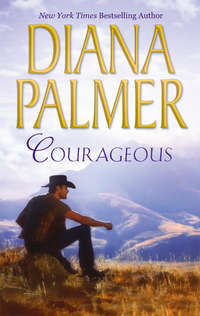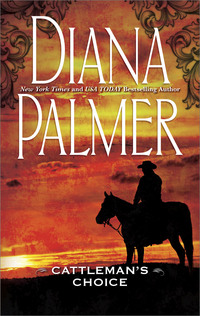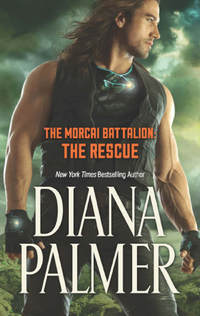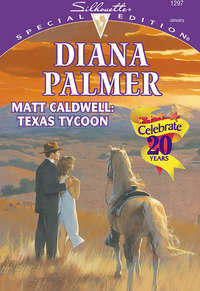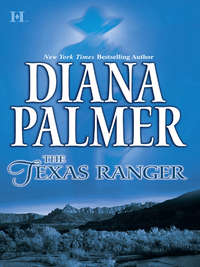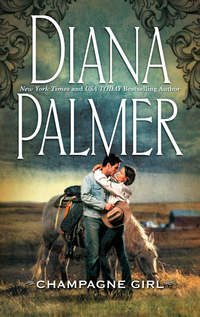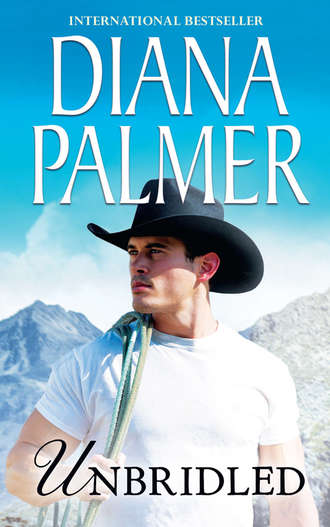
Полная версия
Unbridled
“I’m Tonio,” he said, not volunteering his last name. He didn’t advertise his dad’s profession. He knew that his dad was around emergency rooms a lot. She might recognize the name, and he didn’t want her to. Not yet.
She smiled. “I’m Sunny. What would you like?”
He pulled out a dollar bill. “I always have money for the machines,” he explained. “I eat at school, but mostly it’s healthy stuff. I like junk food.”
She laughed. “Me, too,” she confessed.
She got a cup of black coffee for herself and a sweet roll, something to keep her blood sugar up. She was forever running on the job. She only slowed down when she went off shift.
Tonio got a pack of potato chips and a cup of hot chocolate.
“I like the hot chocolate, too,” she remarked. “I don’t usually like it out of machines, but this one seems to be a fairly decent crafter of hot beverages.”
He grinned. She smiled and the sun came out.
“Do you go to school around here?”
“Yeah. At San Felipe,” he added and then watched for her reaction.
“Is it a middle school or a high school?” she asked. She made a face as she sipped hot chocolate. “Sorry, I don’t know much about education these days. I’m not married.”
“Wow, really? I’m not married, either!”
She gave him a wide-eyed look and then burst into laughter.
He laughed, too. He hadn’t laughed so much in a long time.
“This is a really nice place,” he commented.
“It is. I’ve worked here ever since it opened. I’d just graduated from nursing school.”
“What did you mean, about somebody in Serpientes being killed?” he asked.
She frowned. “I shouldn’t talk about things like that to someone your age,” she said gently.
He was going to tell her that he knew all about murder, because his dad was in law enforcement. But he didn’t want her to know. He didn’t want to tell her about his dad. He wasn’t even sure why.
“Okay,” he said. “If you want to stunt my educational growth. But I’m eleven, going on twelve. And I do watch the local news on TV,” he added.
She wrinkled her nose. “I guess you’re old enough. He was found shot to death on the street, with a wolf’s head drawn in chalk near the body.”
“Los Diablos Lobitos want their territory, so they killed a Serpiente as a warning, I guess, to try and scare them off.” He fished in the package for the last of the potato chips. “I don’t want to be in a gang,” he added heavily. “Lobitos make you kill somebody in order to join. I did a dumb thing once. I ran away from home and I got to know this boy who belongs to the gang. I said I’d like to be part of it, but I was real upset and I didn’t know what I was doing. Except that they told Rado, and now he’s on my case.” He grimaced. “He makes these threats. Like today.” He lifted angry brown eyes to hers. “He said that he wanted somebody to take drugs into the hospital. Into a children’s hospital! He’s crazy!”
She searched the boy’s eyes. “You have a heart. You don’t seem at all like the sort of person who’d deal drugs to little children.” She smiled.
His heart jumped. He felt the praise go right to his own heart. She made him feel...different. Good and useful. She made him feel as his mother had, when she was alive.
“I never would,” he replied. “That Rado, though, he would,” he added with a heavy sigh.
She glanced at her watch with the second hand and sighed. “Time to go to work.”
“Is it hard, working here?” he asked. “I mean, my cousin works in one of the offices. But you have to be with the kids when they...well...”
Her face was sad. “Yes. We lost a child a few days ago. I cried and cried. We’re not supposed to get involved with patients, but she was so sweet...” She swallowed, hard, and fought tears.
He never touched people. Not even his dad. But he reached out a hand and grasped hers in it, tight. “My mother always said that God picked all sorts of people for the bouquets He made, little ones and big ones alike. She said...” he tried to remember “...that we have to accept that the days of our lives are numbered, and that we have to make the best of every single one we have.”
“Your mother must be a very special person,” she said, returning the pressure of his hand for a second before she released it to pick up her coat and purse.
“She was,” Tonio said with a sad smile. “She was a nurse, too, but she didn’t work here.”
She hesitated, seeing the sorrow in his big, brown eyes. “I’m so sorry,” Sunny replied. “I know what it is, to lose a mother.” Her brown eyes were sadder than his. “I lost my whole family.”
He grimaced. “I’m sorry, too.”
“Life compensates us, my mother used to say. She was a good person, too.” She glanced at her watch. “I’d better get moving before my new supervisor hangs me out the window from a sheet. Nice to have met you, Tonio. Maybe I’ll see you again.”
“Same here. And I hope I see you again.”
She grinned. “Bye.”
“Bye.”
He watched her go and felt as if the sun had just gone down. He’d never met anybody like her. How odd, to have a stranger come into your life and feel like part of your family.
He wondered which one of the wolves had killed the Serpiente. He wouldn’t have put it past Rado. He was grateful to Sunny for protecting him, but troubled that Rado had sworn revenge. He hoped his new friend wasn’t going to get hurt because of him. But, then, Rado often threatened people. It had been nice, having somebody stand up for him. She could see that he had Hispanic blood, too, and that hadn’t stopped her from defending him. He liked that. She wasn’t beautiful, but he thought she was pretty, with her long blond hair and big brown eyes and sweet smile. He really hoped that he’d see her again.
He sat back and sipped his hot chocolate, forcing Rado and the gang to the back of his mind.
* * *
The autopsy was routine, and John had grown used to them, after a fashion. But he never quite got used to seeing the damage one human being could do to another. This young boy, nude on the table, with cobra head tattoos all over him, had a mother and father somewhere. How would he feel, if that was his Tonio on that table? It made it far more personal than he liked to admit.
The attending coroner was speaking into a microphone, detailing the damage and extracting material that might help point to the perpetrator. John was pretty sure that it was one of the wolves, but he had to have evidence to find out which one had killed the boy.
Besides John, there was a representative from the San Antonio Police Department’s violent crime unit, a detective named Bronson. He was about John’s age and had apparently seen his own share of autopsies. He didn’t seem to be overly emotional, like the brand-new detective who’d shown up at the autopsy and had to absent himself to throw up.
John looked over the body at the detective with that thought in his head and a faintly quizzical look in his black eyes.
The detective glowered at him. “I don’t throw up at autopsies.”
John smothered a laugh, turning it into a cough.
The coroner glanced up, rolled his eyes and went back to the body.
“Cavitation,” he murmured, sighing. “Catastrophic damage to the heart.” He looked up, angry. “Just a kid, and they killed him over drug territory. This is unspeakably sick.”
“Tell me about it,” John said quietly. “He wasn’t even into his teens, by the look of him.”
“Your boy’s about this age, isn’t he, Ruiz?” the coroner asked gently.
John grimaced. “Tonio’s eleven,” he agreed. He scowled. “These autopsies get harder when you’ve got a kid the same age as the victim.”
“That’s why we do what we do,” the detective interjected. “To keep more kids from dying like this.”
John smiled at him. “Good point.”
Just as he spoke, the coroner extracted a bullet. “Exhibit number one,” he said proudly as he dropped it into a dish.
“Hopefully, it has something to connect it to the killer,” John agreed, studying it. “Not too much damage, that will help. Looks like a .22 slug.”
“Damned Saturday Night Specials,” the detective muttered. “More dangerous than a higher caliber gun, because the bullets fragment and cause more damage.”
“Exactly,” John agreed.
“Well, if the bullet kills you, the caliber isn’t all that relevant, now, is it?” the coroner asked them.
They conceded the point.
* * *
John was home late. He searched in the fridge for sandwich meat and got mustard and bread down from the cabinet.
Tonio poked his head out the door of his room. “You home for good?”
“Well, for the night, I hope,” John said. “You hungry?”
Tonio grinned. “Always. What you got?”
“Bologna and mustard.”
“Okay.”
They sat down at the table to eat.
Tonio was still happy about his new friend, although it was a secret he didn’t want to share with his father.
He noticed the hard lines in his dad’s face. Harder than usual. “Something bothering you?” he asked. It was unusual, because he didn’t notice his father much these days.
John nodded. “I had to attend an autopsy. A gang shooting victim. The kid wasn’t even into his teens.”
Tonio pretended ignorance. “A gang victim?”
John nodded, not paying much attention to Tonio’s expression. It was a shame.
“Los Lobitos?” Tonio probed.
“No,” John replied after a bite of sandwich and a sip of black coffee. “One of Los Serpientes.”
“Los Lobitos kill him, you think?” Tonio asked.
He looked up, black eyes narrowed. “You aren’t hanging around with that gang?” he asked suspiciously.
He gave his parent his best surprised expression. “Not me!” He wasn’t about to let on that he already knew about the shooting, from his new friend. “Isn’t Los Serpientes a Houston gang?” he asked. “They were on the news...” He trailed off, letting his dad think that was how he knew about the serpents.
It seemed to work. His father’s face relaxed. “They used to be a Houston gang. Now they’re in a lot of places. They’ve been in San Antonio for several years, that I know of. It seems that the serpents are encroaching more heavily on the wolves’ lucrative drug territory, so they’re setting an example,” came the sad reply. John shook his head. “God, I’m tired of dead kids!”
Tonio was certain that Rado knew about the shooting. He wondered what David knew about it. Or if he knew anything.
“You stay out of gangs,” John said shortly. “I’m not going to any more autopsies on boys. You hear me?”
Tonio forced a smile. “I don’t do gangs. Really, Dad,” he added, because they both remembered that he’d been willing to join a gang when he ran away from home.
John searched the eyes that were so much like his own. He smiled gently. “Okay.”
“You’re gonna get whoever killed him, right?”
John chuckled. “I always get my man. Or boy. Or woman.” He shrugged. “Whatever.” He finished the sandwich. “How’s school?” he asked.
“You know, it’s not so bad,” Tonio said surprisingly. “They have a really good soccer program. I thought... I might go out for it?”
John was hesitant. Tonio had been militant about joining before. It was an olive branch. “Tell you what. You bring your grades up and keep out of trouble until spring, and I’ll make sure you’re properly outfitted. How about that?”
Tonio’s heart lifted. “Deal!”
John smiled. He sipped his coffee. “This is sort of nice,” he said after a minute. “We don’t talk enough.”
“Well, that’s because—”
Before he could get the whole sentence out, the alert went off. John grimaced as he pulled out his cell phone. “Ruiz. Yeah? Oh, hell! Not another one?! Yeah, I’ll be right there. Twenty minutes.” He hung up.
“I gotta go.” He got up from the table and went to swing his coat off the rack and top his head with the cream-colored John B. Stetson hat he favored. “Don’t stay up too late, okay?”
“Okay. You said ‘not another one,’” Tonio ventured. “Another gang shooting?”
John nodded curtly. “You keep away from any boys with ties to Los Lobitos, you hear me? I’m not burying you!”
“I meant it. I don’t do gangs,” Tonio promised. “They know who got shot?”
“Not yet. We still haven’t even identified the other victim, the Serpiente who was killed. Now this! Keep the doors locked.”
“I will,” Tonio said.
And with a wave, his father was off to the wars again. Tonio sat back in his chair. It was a shame. Just when they started to talk, to really talk, the job came barreling in to put another wall between them.
But now, Tonio had a new friend. That nurse, at the hospital. She was sweet and kind and she listened. He hoped he’d see her again. She made life seem hopeful.
* * *
Sunny had barely slept. She’d had nightmares the night before, probably a result of the conflict with Rado and the gang near the hospital. She’d relived her own tragedy, the one that Rado was part of. It had been a sad and terrifying dream. She woke sweating, crying. Not the best start to the day. Or what was left of it. She worked nights, so she slept late usually. Not today, though.
She made herself a sandwich and some black coffee and finished it before she dressed in her comfortable scrubs, picked up her purse and walked to work, a half hour early, again. She was going to work a double shift tonight, too, because she was covering for a woman with a sick baby. She didn’t mind. It was just that she’d be asleep on her feet by the time she got off the next morning. At least she wouldn’t have to get a cab home after work.
She always took a cab home when it was dark, despite the proximity of her apartment to her job. She had a real fear of being assaulted by one of Rado’s goons. But in the daytime, there were a lot of people on the streets. She felt fairly safe.
She walked in the front door and there was her new young friend, sitting in the canteen with his eyes on the door.
He spotted Sunny and his whole face lit up. She smiled, too. There was the oddest bond between them. He was young enough to be the son she’d always wanted and never had. Perhaps she reminded him of his mother, who had been a nurse, too. Whatever the reason, he made her feel happier than she’d felt in a long time.
She walked into the canteen. “Got time for a snack?” she asked him.
He laughed. “Always.” He studied her, frowning. “You don’t look so good.”
“Bad night.” She laughed. “Bad day,” she corrected. “I have nightmares, sometimes,” she confessed. “How’s the hot chocolate?”
“Great. I think they cleaned the machine,” he teased.
She got her own, and an energy bar, and sat down to eat it. “How was school?” she asked.
“Great! I may get to go out for soccer in the spring!”
“You like soccer?” she asked. “It’s my favorite sport! What’s your team?”
“Madrid Real,” he said at once.
She grinned. “Mine’s Mexico. The World Cup comes up next year. I can hardly wait! We’re going all the way this time, idiot referees notwithstanding. Last World Cup, we got penalties we never should have had, because one of the referees made bad calls.”
“I saw that,” Tonio confessed. He cocked his head. “You don’t root for the American team?”
“Well, it’s like this,” she said. “My great-great grandmother was one of Pancho Villa’s band during the Mexican War, back in the early part of the twentieth century.”
“Really?!”
She laughed. “I know, I don’t look it, do I?”
He shook his head. “No. You don’t.”
“Well, there are lots of blonde women in northern Spain. That’s where my ancestor came from. She married an American and they lived in Mexico. She was a character. She flew planes, drove race cars, they even said she was a spy for a while.”
“Gosh.” He was impressed. “Our people came from Spain originally, too,” he confessed. “But our family came to America from Argentina.”
She caught her breath. “Argentina,” she said with a sigh. “I’ve read about it for years. The gauchos. The pampas. The dances!”
“Dances?”
“The tango. It was almost invented in Argentina,” she said. “It’s the most beautiful dance I’ve ever seen.”
Tonio almost blurted out that his dad was a past master of that dance, and many others. But he didn’t want to talk about his dad. Very often, when people knew his father was in law enforcement, they started backing away. He didn’t want to lose Sunny when he’d only just found her.
“When I grow up, I’ll learn it, just so I can dance with you,” Tonio teased.
“Gee, by the time you’re grown, I’ll be walking with a cane,” she teased back.
“Will not!”
“I’m twenty-three,” she pointed out. “Old, compared to you.”
“I think senior citizens are very cool,” he replied with twinkling eyes. “So I’ll keep your cane polished and repaired. How’s that?”
She smiled from ear to ear.
“There was another gang shooting last night,” he said after a minute.
“Another one?!” She didn’t stop to question how he knew. She looked at him worriedly. “You don’t have gang members where you go to school, do you?” she asked. She was concerned, and it showed.
Tonio felt warm inside, seeing that. “No, of course not,” he said at once, lying because she seemed really worried about him. “Just regular kids, like me.”
She let out a breath. “Thank goodness!” She finished her coffee. Her eyes were sad. “That Rado,” she said with quiet venom, “should be locked up and the key thrown away. He’s gotten away with more murders than he’s even been charged with.”
His heart jumped. “He has?”
She looked down at her coffee cup. “It was his gang that killed my mother and my little brother,” she said, and then regretted saying it out loud. She grimaced. “You don’t tell anybody that, okay?” she added worriedly. “I shouldn’t have said it.”
“I never tell anything I know,” he replied. “They killed your family?” he added, shock in his voice.
She nodded. “They were after the former tenant, who’d sold them out. They didn’t know he’d moved.” She swallowed down the memory. It was horrific. “That didn’t bring my family back, of course. He and the boy who did the shooting were arrested. The boy did time. Rado had a convenient alibi. They couldn’t break it.”
Now he understood that sadness in her, that showed even when she smiled. He could only imagine how it would feel, if his own family had been shot to death in front of his eyes.
“Do you have anybody else?” he asked.
She managed a smile. “I had an elderly aunt, but she died two years ago. I’ve got nobody, now.”
“Yes, you do,” he said, and he smiled at her. “You’ve got me. I’ll be your family.”
Tears welled in her eyes and spilled over. She grabbed a napkin and dashed them away, embarrassed.
“Sorry,” he said quickly. “If I offended you...”
“No! I’m not offended.” She swallowed, hard. “It was the nicest thing anybody’s said to me, in a very long time.”
He sighed, and smiled, relieved.
She stuffed the napkin into her pocket. “I’ve got to go or I’ll be late for my shift.” She paused as she started to leave. “Do you have family?”
“It’s just me and my dad,” he said reluctantly.
“At least you have somebody,” she pointed out. She hesitated. “But you’ve got me, too. If I’m your family, you’re my family, too. Right?”
He cocked his head. He grinned from ear to ear. “Right!”
She laughed. “Okay. See you.”
“See you.”
* * *
One of the nurses on duty had seen the story about the gang shooting on the news, but it was only a flesh wound. Police had been at the hospital to take the boy into custody, but his companions rushed him out the door before the police could get near him. The name he’d given was an alias. They noticed tattoos on him. Wolves’s heads. Retaliation, probably, for the dead Serpiente gang member. The nurse said they were still hunting for the victim.
Sunny worried about Tonio. He was just the right age for Rado to want to recruit him. She didn’t know what she could do to protect him, but she’d do anything she could. She was already fond of him.
* * *
Two days later when she came on shift early, Tonio was in the canteen again, waiting for her. One of the nurses noticed this and teased Sunny about her young gentleman friend, only to be informed that he was her family. The nurse knew her background and understood. She just smiled.
After her shift, Sunny was thinking about Tonio as she went down the hall. She was almost due for her days off, so she wouldn’t see him again right away. She was almost to the elevator when she noticed a San Antonio police detective who came onto the ward and paused at the desk. She knew that he was probably asking about yet another shooting victim who’d been brought in the night before.
Sunny knew he was going to want to talk to her, because she’d been the nurse on duty when he was placed on the ward following emergency surgery. She’d pulled another double shift, tonight, this time because two nurses were down sick and they were shorthanded. The gang shooting victim on her ward was only ten, a painful reminder that gangs didn’t care about the age of anybody they targeted.
Odd child, to be so young and sound so mature when he talked in his sleep. He had tattoos. Wolf tattoos. It didn’t bode well that this was the third gang shooting in recent days. And it was the second shooting of a member of Los Diablos Lobitos.
The detective spoke to the nurse in charge of the shift, who indicated Sunny and motioned to her. She went to the desk, her coat over her arm, her purse strap over her shoulder.
The man was tall and blond and drop-dead gorgeous. He’d have turned heads anywhere. There were all sorts of rumors about him. The most persistent one was that he’d been with a group of mercenaries in Africa some years ago. That was before he joined the San Antonio Police Department and worked his way up through the ranks to Captain, the position he held now.
Sunny knew him, because he’d been a lieutenant when her family was killed and he’d worked the case. Cal Hollister was a good man, with a kind heart. If Sunny had liked fair men, he’d have been at the top of her Christmas list. But she had a gnawing yen for an olive-skinned man with black dancing eyes.
“Hi, Captain Hollister,” she greeted him, smiling.
“Hi, Sunny. How’ve you been?” he asked gently.
“Life is hard, then you die?” she teased.
He grinned. “So it is. Can I buy you a cup of coffee in the canteen so you can stay awake while we talk?” he asked. It was morning. She’d been up all night and she was tired. He knew it without being told.
“Sure you can,” she said, stifling a yawn.
* * *
He led her into the canteen and purchased two cups of black coffee from the machine. He placed one in front of Sunny as he dropped his tall frame into the chair. There were only a couple of people in the canteen so far, an elderly couple she recognized from the cancer ward; they had a grandchild there, in serious condition.
She forced her attention back to Hollister. “Are things so bad that the brass has to work cases now?” she teased.
He laughed shortly. “I ducked out of a meeting and said I’d promised to help Lt. Marquez interview a witness. I hate administration. I miss working cases.”
“You were good at it,” she said, smiling. “How can I help?” she asked.
“It will be hearsay, and not worth beans,” he began. “But I wondered if your young patient said anything after he went on the ward?”
She hesitated. This was a slippery slope. Anything a patient told her wasn’t supposed to be shared with anyone without permission from the administrator. It was to protect the hospital from lawsuits, that modern pastime that so many people seemed to love.
He chuckled. He produced a signed paper and handed it over. “I always go through channels when I have to. Recognize that signature?”
She did. She’d seen it on memos often enough. It was the hospital administrator’s.
“Okay, then,” she said, relaxing. “He hasn’t said much. He hasn’t had visitors, either. But he did say something, last night,” she confessed. “Although, it was an odd sort of comment, and I’m not sure he was completely out from under the anesthesia at the time. You know that it can make you goofy for a few days after surgery?”


